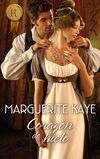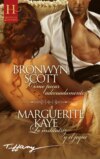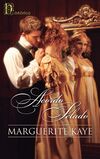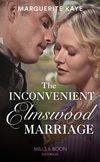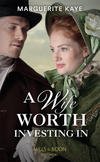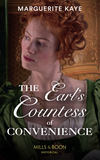Kitabı oku: «Regency Rogues: Candlelight Confessions», sayfa 6
‘You said goodbye.’
Deborah gazed at him helplessly. He waited for her to say something, but she began measuring leaves from the little wooden caddy. Water splashed as she poured it from the kettle into the pewter teapot. ‘I brought only one cup.’
‘I hate tea,’ Elliot said, sitting himself opposite her.
She poured her drink, took a sip and then a deep breath. ‘Why are you here?’
Her antagonism didn’t fool him. She was as nervous as a cat, but she hadn’t been able wholly to disguise the fact that she was pleased to see him. Elliot handed her the newspaper. ‘I thought you might like to see this.’
Deborah scanned the report, her face lightening to a shadow of a smile as she read. ‘I woke this morning persuaded that I had imagined the whole episode. I can’t quite believe it happened even now, despite seeing it reported in print.’
‘Fortunately, there is no indication that anyone knows I had an accomplice, but all the same, you must have a care not to let slip, even inadvertently, anything which might betray you.’
‘I won’t,’ Deborah said, thinking guiltily of the account she had written just this morning of the episode, reassuring herself at the same time that she had changed sufficient details for it not to matter. ‘There is nothing to fear, I am sure. You did not strike me as a worrier, Elliot.’
‘I am not worried for myself, but for you. I care little for my own safety, but I would rather not have yours on my conscience.’
‘You don’t. It was I who persuaded you, if you recall.’
‘I would never have allowed myself to be persuaded if I had not wanted you with me,’ Elliot said with a wry smile. ‘How does it feel, to be so vicariously notorious?’
‘Vicarious,’ Deborah replied pithily. ‘I feel as if it was someone else who clambered down that rope. Though I must confess, my conscience has been bothering me rather belatedly. That painting was very valuable.’
‘And you’re worried about what I’m going to do with the ill-gotten gains,’ Elliot said. ‘No, don’t look like that, I can’t blame you. I’m surprised you haven’t asked before.’
‘I am ashamed to admit that I most likely did not because I didn’t want a reason not to go,’ Deborah confessed. She put down her half-drunk cup of tea. ‘Why do you do it, Elliot? I mean, I can understand, that it’s partly what I wanted—the sheer thrill of it. I can understand, too, that you find civilian life rather boring compared to what you’re used to, but—to say that you care little for your own life as you just did—I can’t believe that you are hoping to be caught.’
‘Of course not. I am bored though, that is a part of it. My sister thinks I need gainful employment and she’s probably right,’ Elliot said, grimacing.
‘Gainful doesn’t sound very like you. I didn’t know you had a sister. Is she in town?’
‘For the moment. Lizzie is married to a dour Scot, who has plans to whisk her away to the Highlands for the birth of their first child.’ Elliot grinned, happy to be sidetracked. ‘I foresee some epic battles between her and her mother-in-law and I know who I’d put my money on. Lizzie is short of neither opinions nor the will to enforce them.’
‘I’d have liked to have a sister,’ Deborah said with a wistful smile. ‘I don’t have any family. My parents died when I was very young and my uncle, who became my guardian, was a bachelor, very set in his ways. When I came back to live with him after finishing school, he didn’t know what to do with me. He didn’t like Jeremy, he told me that he was only marrying me for my inheritance, but he didn’t make much of an attempt to stop me either. “You must make your own bed, and don’t come running to me if you don’t like lying in it,” he said. Not that I would have,’ she concluded, with a twisted little smile.
Did she know how much she had given away with that last little sentence? Elliot wondered, touched by her pride, angry on her behalf at the need for it. ‘Is he still alive?’
Deborah shook her head. ‘He died five years ago. I rarely saw him once I was married. I often wish I had made more of an effort.’ It was surprising how guilty she felt even now, and no amount of telling herself that Uncle Peter had made no effort to keep in touch either made any difference. She had been afraid to let him see her and had kept him at a distance as she kept everyone else. ‘I don’t know how we came on to this subject,’ she said brusquely, ‘you cannot possibly be interested in my rather pathetic life.’
‘I’m interested in you, Deborah.’
She concentrated on tucking a stray lock of hair back behind her ear, dipping her head to cover the faint traces of colour in her cheeks. ‘I can think of any number of topics more interesting.’
Elliot was much inclined to pursue the subject, but his instincts warned him it would be unwise. Teasing out secrets was second nature to him. Knowing when to stop lest he betray just how much he had garnered was a subtle art, but one which he knew he had mastered. Though it had to be said, he admitted wryly to himself, that Deborah was proving to be more of a challenge than any close-mouthed diplomat. ‘Why did I invent the Peacock, then? Does that constitute a more interesting topic?’
Deborah nodded. ‘Provided it does not also constitute an intrusion. I would like to know, for you puzzle me. Your victims are selected too carefully for them to be random. Do you have some sort of personal grudge against them?’
‘What makes you say that?’ Elliot asked sharply.
‘I don’t know.’ Deborah frowned. ‘I suppose I cannot believe you do it for personal gain and there are too many robberies for it to be simply the thrill of it which drives you. You’d have become bored by now if that was it.’
‘You are very perceptive. It is to be hoped that none of the gentlemen at Bow Street has your wit.’
‘None of the gentlemen at Bow Street has my inside information. Is it too personal? I will understand if you don’t wish to say any more.’
Elliot drummed his fingers on the arm of the chair. His instincts were to confide in her, though common sense told him that by doing so he was taking an unwarrantable risk. Not of deliberate exposure, she would not do that, but an inadvertent comment, a remark let slip in the wrong company—how could he be sure she would not do that?
He just knew. She was as close as a clam and, of her own admission, she lived like a hermit. Besides, he wanted to tell her. He wanted her to know. ‘You were right about my victims,’ he said. ‘They are very carefully selected. All of them were at some point responsible for the supply chain—or lack of it—to the army. Medical supplies, orderlies and doctors, boots, basic rations, horses. Most of all horses. They kept us short of all of those things, because after all, what does an army need to fight except guns? Even if you can’t get the guns to the battlefield. Even if you can’t get the men wounded by those guns misfiring back to a field hospital. What do they care? They don’t,’ he said flatly. ‘I know they don’t because all my letters and protests and reports fell on deaf ears at the time, and now—well, now it is done and everyone wants to forget all about it, so there is even less point in letters and reports and protests.’
‘So you take what will hurt them instead.’
‘Yes, that’s exactly what I do.’
‘Did you lose many men because of such shortages?’
‘Yes.’
‘Friends, too? Forgive me, but it seems to me such a very personal thing you are doing, there must have been someone …’
‘There was. My best friend.’ Elliot gripped the arms of his chair so tightly that his knuckles showed white.
‘Henry,’ Deborah said gently. ‘I’m so sorry.’
Elliot nodded curtly.
‘I truly am sorry, I didn’t mean to upset you; you don’t need to say any more.’
‘I want to,’ Elliot said, surprising both of them. ‘I want to tell you.’ He swallowed repeatedly, cleared his throat. ‘We joined up together, Henry and I, I told you that already. We worked our way through the ranks together, though he was much too ill-disciplined to keep his stripes for long. He made it to captain once, but it only lasted about six months. He was a first-class soldier. We always looked out for each other. When I needed an extra pair of hands, I always turned to Henry. He was quick with his fists, but he knew the importance of keeping other things close, which was important in my—my alternative line of business.’
He paused. Across from him, Deborah was gazing at him intently. Would she be shocked? He doubted it, somehow. More likely excited, as she was by the Peacock. That decided him. ‘The thing is, I wasn’t just a fighting man. There’s a reason why the Peacock is so able.’ He grinned. ‘Actually, it’s ironic that the very skills I learned in order to steal secrets are the same ones I use to steal their property now. Most of which, I hasten to add, was stolen in the first place.’
Deborah stared at him in utter astonishment. ‘You mean—what you’re saying is that you—you stole? At our Government’s behest? But why? What did you—oh! My God, you were a spy?’
He should have known how she would react. Her eyes were sparkling. Elliot laughed. ‘Yes, I was.’
‘Good grief! No wonder civilian life bores you. You must tell me—I wish you will tell me—I don’t know—anything, all of it—no, I don’t expect you can tell me all of it. Goodness, what secrets you must know.’ Deborah chuckled. ‘How horrified the likes of Jacob would be if they knew. You are quite right, Elliot, it is irony past price. Can you tell me more? Were you a master of subterfuge?’
Danger, even if it was vicarious, certainly brought her to life. ‘I’m afraid it was rather more mundane than that. If anything, I was a master of patience.’ He told her a few choice stories because he liked to see her laugh, because he found her laughter infectious, and he told her a few more because returning to the subject in hand was too painful, but he underestimated her.
‘He must have been more like a brother than a friend. Henry, I mean,’ Deborah said suddenly, interrupting him in the middle of a story. ‘What happened?’
‘He was wounded in the Pyrenees during the siege on San Sebastian. He took a bullet in the leg, above the knee. It smashed the bone—he’d have lost his leg, but it shouldn’t have been fatal. Only they couldn’t reach him because there were no carts and no mules.’
‘Oh God.’ Deborah covered her mouth, her eyes wide with horror.
Elliot’s knuckles were white. ‘For more than a week, he lay in agony in the blistering sun with his wound festering. He died of a fever a few days after they finally got him to the field hospital. I was with him, at the end, though he hardly recognised me. He died for want of a mule. A mule!’ He thumped his fist down hard on the chair. ‘But what do those bastards in the War Office with their lists and their budgets know of that? What does it matter, when a man with one leg would have been no bloody use to them anyway? What do they know of the suffering, the agonies that Henry and thousands like him went through, and what do they care now for the survivors?’
‘But you care,’ Deborah said, shaken by the cold rage. ‘You care enough to steal from them, to make reparations for them, is that it?’
‘The money goes to a charity which helps the survivors.’ Now that he had opened the floodgates his bitter anger, so long pent-up, demanded expression. ‘Someone has to help them,’ Elliot said furiously. ‘While they fought for their country, their country learned how to do very well without them. Now that the Government no longer needs them to surrender their lives, their limbs and their hearts on the battlefield, it has decided it has no need to reward them with employment, back pay, pensions. It is not just the men, it is their widows and children who suffer.’
‘I didn’t realise,’ Deborah said falteringly.
‘Few people do. All they see is a beggar. Just another beggar. Proud men, reduced to holding out a cup for alms! Can you imagine what that does to them? No wonder so many cannot face their families. And they are portrayed as deserters, drunkards, criminals.’
The scar which bisected his eyebrow stood out white against his tan. The other one, which followed the hairline of his forehead, seemed to pulse. How many other, invisible scars did he bear? His suffering made hers seem so trite in comparison. The grooves at the side of his mouth were etched deep. His eyes were fierce, hard. Deborah trembled at the sorrow and pain they hid, such depths, which made shallows of her own suffering. ‘I just didn’t know,’ she said simply. ‘I am quite ashamed.’ The truth was so awful, it made her conscience seem like a paltry consideration. ‘I wish now that we had taken more from that house in Grosvenor Square.’
Her vehemence drew a bark of laughter from Elliot. ‘Believe me, over the last two years, the Peacock has taken a great deal more.’
‘So it is a war of attrition that the Peacock is waging, is that it? And of vengeance?’
Deborah’s perception made Elliot deeply uncomfortable. He was not accustomed to thinking about his motivations, never mind discussing them. ‘What do you know of vengeance?’ he asked roughly.
Enough to recognise it. Deborah hesitated, surprised at the strength of her urge to confide, but the very idea of comparing their causes appalled her. Besides, his voice held an undertone of aggression that warned her to tread lightly. He obviously thought he had said too much already. She could easily empathise with that. ‘The painting that we stole,’ she said, seeking to lighten the subject, ‘you knew about it because of your spying, didn’t you?’
‘You’ve no idea how much ransacking and looting goes on in the higher echelons in wartime. That painting was a bribe.’
To Deborah’s relief, some of the grimness left his mouth. She asked him to explain; when he did, she encouraged him to tell her of other bribes, relieved to see the grooves around his mouth relaxing, the sadness leaving his eyes. The battered armchair in which he sat, she had rescued from a lumber room at Kinsail Manor. His legs, in their tight-knit pantaloons, stretched out in front of him. If she reached, she could touch her toe to his Hessian boots.
‘I’ve said too much,’ Elliot said, interrupting himself in the middle of a story, realising abruptly how much he had revealed, how little he had talked to anyone of his old life before. It had been too easy to talk to Deborah. He wasn’t sure what he thought of that, accustomed as he was to keep his own counsel. His instincts were to retreat. ‘I must go,’ he said, getting to his feet.
How did he close his expression off like that? Ignoring the flicker of disappointment, Deborah rose, too. ‘You have certainly said enough to make me realise how shockingly ignorant I am. I shall not look on those poor souls with their begging bowls in the same way again.’
Outside, it was grown dark. Elliot lit a spill from the fire and began to light the candles on the mantel. ‘I’d like to call on you again,’ he said.
Deborah bit her lip. It would have been so much easier, had he not chosen to confide in her, if he had not given her so many reasons to wish to know more about him. To like him. In another world, in another life, Elliot was the kind of man she would have …
But there was absolutely no point whatsoever in thinking like that. Slowly, she shook her head. The pang of loss was physical, a pain in her stomach. ‘I live a very secluded life.’
‘I’m not suggesting we attend Almack’s together. We could go for a drive.’
Why did he have to make it so difficult? ‘I can’t, Elliot. I am perfectly content with my own company.’
‘So content that you need to break into houses and climb down ropes to make you feel alive?’
Deborah flinched. ‘I thought you understood. That was an escape from reality, merely.’
‘I don’t understand you.’ Elliot cast the spill into the fire. ‘One minute, you are hanging on my every word, the next, you imply that you never want to see me again.’
‘I’m sorry. I didn’t think that you would expect—I never considered us continuing our acquaintance after last night. I should not have encouraged you to confide in me, but I was so caught up in what you said and—I should not have,’ Deborah said wretchedly. ‘I’m sorry, Elliot.’
‘And what about last night? You are sorry about that, too, I suppose? Dammit, I was not imagining it, the strength of attraction between us. Why are you hell bent on ignoring it?’ Frustrated and confused, Elliot pulled her roughly towards him. ‘You can’t deny it! I can feel your heart beating. I can see it in your eyes that you want to kiss me just as much as I want to kiss you.’
‘No. Elliot, please …’
He was so sure, so certain that if he could just kiss her, it would rekindle the flame that had flared between them last night, but he had never in his life used persuasion on a woman in that way, and would not do so now. Elliot threw himself away from her. ‘I apologise,’ he said curtly. ‘I have obviously completely misjudged the situation.’
‘No,’ Deborah whispered, ‘it is I who did so. Last night, I gave you to think that I would—when I could not. Cannot. You have nothing to apologise for.’
It went against the grain to leave her like this but she left him no option. ‘Your servant, Lady Kinsail.’ Elliot sketched a bow.
‘Goodbye, Elliot.’ He was gone before she had finished saying the words, the front door slamming behind him. Deborah could not resist peering out into the gloom through the window, but he did not look back.
Alone in the parlour, she squared her shoulders. It had cost her dear, not to kiss him. It had cost her even dearer, that look on his face when she behaved so contrarily, but it was for the best. Elliot was not Jeremy, but it made no difference. Never, with Jeremy, had she come close to feeling what Elliot made her feel, but that just made things worse. She did not want to feel anything.
‘It’s over,’ she said to herself, pulling the curtains across the window. It would have been easier, knowing Elliot less, but it was too late for that now. Knowing him better simply made her more certain she was right. But staring into the flames of the fire, Deborah couldn’t help wishing that things were different.
Chapter Five
As he walked home from Hans Town, Elliot was angry. He was hurt, too—at least his pride was hurt, that was all, he told himself. He was not used to rejection. He did not understand why Deborah had rejected him, but nor could he ignore the fact that she had and quite unequivocally. He would not see her again. It didn’t matter a damn that she was the only woman who interested him, it was over. There were plenty more women in England.
As he changed into evening clothes, a melancholy seized him. It was not just his pride that was hurt. He had confided in her. He’d taken his sister’s advice and actually let someone cross the threshold of his feelings. She’d understood him, too—a little too much for comfort, actually—but she had seemed so sympathetic. The more he replayed their conversation in his mind, the more inexplicable he found her behaviour.
Dinner at Lizzie’s was a trial. Though he liked Alex, found the dour Mrs Murray amusing and under normal circumstances would have enjoyed baiting that wily old dog Lord Armstrong, Elliot was morose enough for his sister to take him aside and ask him if he was sickening for something. He left the party early.
Impatient with himself as he tossed and turned in a vain effort to sleep, determined not to succumb to the temptation to call on Deborah again in the morning, Elliot decided to pay an overdue visit to his estates in Hampshire. Lizzie was right, he needed an occupation; since he could not, for the moment, contemplate planning another outing for the Peacock, he would interest himself in the running of his lands.
‘Well now.’ Mr Freyworth, second of the sons for which the publishing house was named, laced his hands together and sat back in his seat. The spectacles which he used for close reading dangled on a chain around his neck. Across from him his client sat, her face as expressionless as ever, and once more Montague Freyworth found himself wondering how such a cold—nay, icy—female could possibly be the authoress of such shocking books. He looked down at the close-written pages before him and tapped one scrawny finger on the topmost. ‘Well now,’ he said again, ‘this is certainly most—I think it would be fair for me to say that it is warmer than your last novel. In fact,’ he said with an attempt at humour which did not sit with his sparse, crow-like form, ‘I almost expected the paper to burst into flames while I was reading it.’
Deborah smiled tightly. Though her acquaintance with the publisher spanned the four years of Bella’s existence, it could not be said that they were any closer than they had been that first day, when she had sat, sick with nerves, in this very seat in this very room, waiting upon his verdict. ‘You said you thought that the last book was rather—flat, I believe was your word,’ she said carefully.
The publisher nodded. ‘Flat. Yes, you are quite correct. Lacking a certain frisson. Flat was, I believe, the very word I used.’
‘I trust you do not wish to apply it to this story?’
Montague Freyworth’s thin mouth stretched into the semblance of a smile. ‘Indeed, no. Indeed, no. The housebreaking incident is most vividly described.’
He picked up a paper knife, then put it down again. His fingers began to drum on her manuscript which lay on his blotting pad. It was a habit which had often made Deborah grit her teeth, for though she did not mind ink stains or crossings out, she hated to have her original draft, which she thought of as her creation, her child, so roughly manhandled. With difficulty, she resisted the urge to swat her publisher’s hand away. ‘So you like it? The robbery, I mean.’
‘First rate. I must say, Lady Kinsail, absolutely first rate. One could almost believe that you had been there yourself.’
Deborah produced a tinkling laugh that she was relieved to hear sounded almost natural. ‘A compliment indeed.’ Discomfited, she decided to overlook Mr Freyworth’s overt use of her name. It was one of the many unwritten rules which governed their relationship, the pretence of ignorance on his part. Just as she was happy not to acknowledge that the respectable house of Freyworth & Sons made a handsome return on the lurid volumes they printed for her under another publisher’s name.
‘As I said, it was most enthralling.’ Montague Freyworth resumed fiddling with his paper knife. ‘The aftermath, now—the scene between Bella Donna and the housebreaker—I think that—’
‘What I tried to convey was that for once, Bella was quite carried away by the illicit excitement—the more acute sense of danger. The impulsive way she behaved, it was an outlet for her pent-up feelings.’
Mr Freyworth held up a hand. ‘You have no need to explain, madam, I quite understood it. What I was going to say was that I was also rather—forgive me, but this scene too had about it an authenticity which elevates your writing to a new plane.’
‘Oh! Oh, I see.’ Deborah gazed in confusion down at her gloves.
Across from her, Montague Freyworth was astonished to note a blush staining her pale cheeks. Not such a cold marble statue after all, the Widow Kinsail. Well, well. Mrs Freyworth would gobble up that little snippet. It was she who, unbeknownst to the authoress herself, was responsible for the critical reading of every one of Bella Donna’s lurid tales—tales which her husband found not just disturbing, but whose appeal he found incomprehensible. ‘What I wanted to say,’ Montague said, ‘was that I feel the book would benefit from—er—more of such scenes.’
‘More?’ A hysterical laugh, quickly stifled, escaped from Deborah. ‘I thought you were going to ask me to cut it.’
‘No, no.’ Montague shook his head vehemently, recalling his wife’s admonition. ‘It is felt—I feel—that is—frankly, my lady—I mean, madam—’ He broke off, drumming his grubby fingers on the blotting pad, trying desperately to think of a way of rephrasing Mrs Freyworth’s words. ‘The crime is all very well and good, but what really excites the reader is the aftermath. What I’m saying, Montague, is that the insertion is more interesting than the removal.’ He had to concede that his wife had a singular ability to express herself both graphically and succinctly. She was every bit as direct in the sanctity of their bedroom, a fact which was almost entirely responsible for their astonishingly satisfying marital relationship, but there were times—many times—when Montague wished that she would confine her remarks to that chamber.
He sighed heavily and inadvertently caught his client’s gaze. He never had been able to decide, in all these years, what colour her eyes were. Was she laughing at him? He narrowed his own uncomplicated blue orbs, but could not be quite sure whether the tilt of her mouth was humour or impatience or simply a tic. She had a way of tilting her chin at him, lifting one brow—there, just like that—that made him feel rather more like an insect she wished to stamp on than he liked. Montague put down his paper knife once more and picked up the manuscript, tying the ribbon which bound it. Handing it back, he saw that it was rather dogeared and saw, too, from the look of distaste on the Widow Kinsail’s face, that she had noticed and didn’t like it. The tiny glow of his having irked her gave him the momentum he needed.
‘The story needs another felony. And afterwards—well, suffice it to say that you can let that imagination of yours loose on your pen,’ he said with something approaching a wink. ‘Set the pages aflame, Lady Kinsail, and I am sure that we will run to three, maybe four editions.’ Deborah hesitated, torn between triumph and horror. ‘I had not planned …’
‘Nonsense! You’ve done exceeding well with the robbery of that statuette—how hard can it be to dream up another such?’ Mr Freyworth got to his feet in an effort to cut short any protestation. ‘Think of the returns, madam. Three, four editions I say, and that will be just the start. The interest will generate a demand for the earlier books, too, I am sure of it.’
He was actually rubbing his hands together, Deborah noticed, trying not to laugh, for Mr Freyworth’s tall, scrawny frame, the hollowed cheeks, the thin, fluffy covering of black hair through which his skull showed like an egg, combined with the dusty black clothes he wore, made him look like one of the neglected Tower ravens. She held out her hand, tucking her manuscript under the other arm. ‘I will attempt to do what you say, sir.’
‘I am sure you will not disappoint, madam. I look forward to seeing the results. And if you could perhaps manage to complete the revisions in—say two or three weeks?—then we shall, if we put our minds to it, be able to rush through the first edition in time for Christmas.’
‘I hardly think that Bella Donna’s exploits will be the most popular of yuletide gifts,’ Deborah said with a dry smile.
Montague Freyworth patted her shoulder. ‘Now then, my lady, you must allow me to know my business rather better than you. You would be surprised by the number of people who will purchase your little story if it is nicely bound and discreetly marketed. I will not say that you will see it on every drawing-room table, but I will make an informed guess that you will find it in most boudoir cabinets. Good day to you now, madam. And happy writing.’
Rather dazed, Deborah made her way out on to Piccadilly. If what Mr Freyworth said was true, the profits from her pen could free her from the necessity of relying upon her widow’s portion. Free her from the last tangible remnants which bound her to Jeremy. Just thinking about the possibility made her realise how much she still resented those ties, despite the knowledge that she was more than deserving of the income which was, after all, originally sourced from her very own inheritance.
Wandering down the busy street, oblivious to the swarms of traffic heading to the park, for it was the beginning of the Season and approaching the hour for parading, Deborah surrendered herself to the dream of independence. True independence. And all it would take, if Mr Freyworth were to be believed—and why should such an astute businessman lie?—was one more robbery and its aftermath. Surely she could do it?
Three days later, Deborah scrunched up another piece of paper ruined by crossings out and ink blots, with a hole in the middle where she’d pressed her pen too hard in sheer exasperation. She couldn’t do it. She just couldn’t do it! Throwing the paper ball into the empty hearth with an accuracy born of far too much practice, she pushed back her chair and began to pace the room. Back and forwards she went, between the window and the far wall, a route taken so often that the carpet was beginning to show signs of wear. The familiar litany dogged every step.
Authenticity is the key.
Authenticity will bring you a third edition. A fourth.
Authenticity will bring you independence.
Independence will bring you freedom.
You will be free. Free of the past. Free of Jeremy. Free.
Authenticity will bring freedom.
Elliot is the key to authenticity.
Elliot.
You need Elliot.
You can’t do it without Elliot.
He’ll most likely be planning another robbery around about now in any case.
And it’s for a good cause. The money you give now to every beggarly soldier is a drop in the ocean compared to what his ill-gotten gains can do. You’d be helping save those men and saving yourself.
You need Elliot.
Elliot is the key.
You need Elliot.
You need to see Elliot.









